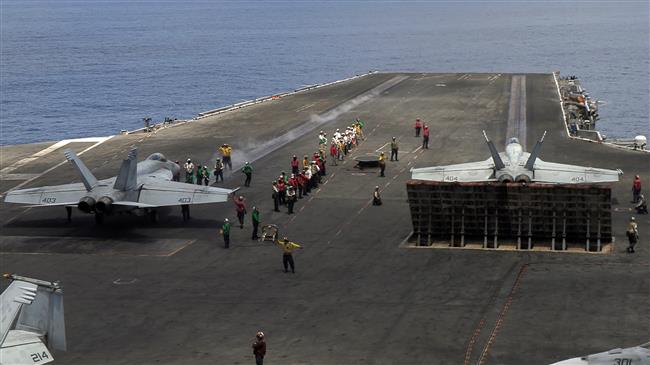Beijing warns US against provocations after two warships sailed in South China Sea
Two US warships have sailed close to the islands claimed by Beijing in the disputed South China Sea in a move harshly denounced by China as provocative acts, which could result in “unforeseeable accidents” in the strategic waterway at a time of heightened tension between the world’s two largest economies.
The US military acknowledged on Thursday its warships twice sailed near the islands in the past few days.
The combat ship, Gabrielle Giffords, sailed within 12 nautical miles of Mischief Reef on Wednesday, and the destroyer, Wayne E. Meyer, traveled close to the Paracel islands on Thursday, said a spokesperson for the US Navy, Reann Mommsen.
Mommsen said, “These missions are based in the rule of law and demonstrate our commitment to upholding the rights, freedoms, and lawful uses of the sea and airspace guaranteed to all nations.”
China reacted to the move with anger on Friday, calling on the US “to stop provocative acts in the South China Sea” over which it “has indisputable sovereignty.”
The resource-rich sea has long been a source of tension between Beijing and Washington, which regularly dispatches its warships and warplanes to the waters as part of what it describes as “freedom of navigation” patrols.
The US has been taking sides with several of China’s neighboring countries, which have competing sovereignty claims on the strategic waters.
Beijing has constantly warned the US against its military activities in the sea, saying that potential close military encounters by air and naval forces of the two countries in the region could easily trigger miscalculation or even accidents at sea or in the air.
Earlier this week, Chinese Defense Minister Wei Fenghe urged Pentagon chief Mark Esper during a meeting to stop “flexing its muscles in the South China Sea and to not provoke and escalate tensions in the South China Sea.”
Esper had previously accused Beijing of “increasingly resorting to coercion and intimidation to advance its strategic objectives” in the region.
The developments came as relations between the US and China have been strained over an array of issues, including a trade war, US sanctions on China’s military, US ties with Taiwan, as well as Washington’s interference in the Chinese city of Hong Kong.
The semi-autonomous city has been rocked by a spate of turbulent protests since June, when people outraged by a proposed extradition bill descended on the districts across the city. The bill was later withdrawn, but the protests continued and took on an increasingly violent form.
The Chinese government says the United States and Britain have been fanning the flames of unrest in Hong Kong by supporting the protesters.
On Tuesday, the US Senate passed a bill entitled the Hong Kong Human Rights and Democracy Act, compelling Washington to support anti-government protesters in Hong Kong and to impose sanctions on Chinese officials allegedly responsible for what the bill called human rights abuses in the territory.
Chinese Foreign Minister Wang Yi denounced the move on Thursday, saying the so-called bill “indulges violent criminals” and aims to “muddle or even destroy Hong Kong.”
Hong Kong has been governed under a “one-country, two-system” model since the city was returned to China in 1997.
US irritated by China-Pakistan ties
In the meantime, the US is angered by increased economic and diplomatic relations between China and Washington’s traditional ally, Pakistan.
China launched several projects in the Pakistani port of Gwadar under the China-Pakistan Economic Corridor (CPEC) back in 2015, including a power plant and a vast network of highways and railways to connect Gwadar to China’s Xinjiang.
Several projects, including a power plant, were inaugurated in the Pakistani port, which will further promote the implementation of the CPEC.
US acting assistant secretary of state for South and Central Asia, Alice Wells, said on Thursday that the Chinese multibillion-dollar initiative “is not about aid.”
"It's clear, or it needs to be clear, that CPEC is not about aid," Wells said. "CPEC relies primarily on Chinese workers and supplies, even amid rising unemployment in Pakistan.”
The corridor "is going to take a growing toll on the Pakistan economy, especially when the bulk of payments start to come due in the next four to six years," she claimed.
The US has already gone on the offensive against China's multitrillion-dollar Belt and Road Initiative (BRI) project, which was launched by President Xi Jinping back in 2013.
The trade infrastructure project envisions the construction of railways, roads and ports across the globe to connect China by land and sea to Southeast Asia, Central Asia, the Middle East, Europe and Africa.
Israel admits assassinating Hamas leader, vows to inflict same fate on Yemeni fighters, people
VIDEO | Yemeni forces repel US-British attack, down F-18 Jet
Iran’s capabilities vast; enemy’s ‘maximum pressure’ policies all failed miserably: Senior official
Iran’s economy grew 2.7% y/y in Sep quarter: CBI
VIDEO | Freelancers in Gaza strive to stay online amid genocide
Mikati demands Israel's withdrawal from south Lebanon
Yemeni army strikes Israeli military sites with drones
‘Clock ticking’: UNRWA slams unjustifiable killing of children in Gaza













 This makes it easy to access the Press TV website
This makes it easy to access the Press TV website